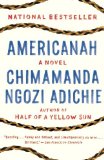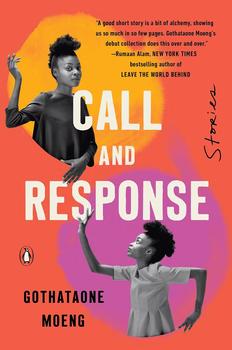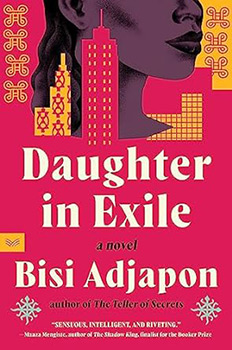Summary | Excerpt | Reading Guide | Reviews | Beyond the book | Read-Alikes | Genres & Themes | Author Bio

Critics' Opinion:
Readers' Opinion:
First Published:
May 2013, 496 pages
Paperback:
Mar 2014, 608 pages
 Book Reviewed by:
Book Reviewed by:
Sarah Sacha Dollacker
Buy This Book
When Ifemelu, a main character in Chimamanda Ngozi Adichie's Americanah, suggests that novels can be about "more than one thing," she could easily be describing the story in which she plays a primary part. Americanah is at once a romance, a coming-of-age journey, an immigrant's tale, and a searing social commentary. It is rich with life and abundant in precise detail about the human experience. Adiche's first two novels unfold in Nigeria (the second novel Half of a Yellow Sun won the Orange Prize in 2007) but Americanah cuts new ground. Set in America, England, and Nigeria, it is broad in scope and analysis. Adichie's power of descriptive detail and character development are on full display. Though the novel occasionally unfurls into raw social commentary, the primary story of Ifemelu's quest for self is beautiful and captivating.
The story opens with Ifemelu at the brink of leaving America to return to Nigeria. She has little explanation for wanting to leave America, except for the fact that she must return home. After years in the States, during which she has graduated from college, repeatedly fallen in love, started a prosperous Internet blog that examines American race matters from the perspective of a "Non-American Black," and attained an American passport, her choice to return to Nigeria appears somewhat incongruous. Though Ifemelu has gained great success in America, the persistent and creeping fear that something is missing, plagues her. There is little job opportunity in Nigeria, and she is not close to her parents, but the sense that America has nothing more for her weighs on her heart like "concrete." It almost seems necessary for her to return to Nigeria.
In contrast to Ifemelu's experience in America, her friend Obinze, whom she dated in high school and college, has had his own challenges outside of Nigeria. After attempting to find success in England, he, too, has returned to his birthplace. As a result of investing in real estate, Obinze has made a fortune. Nigeria is notorious for corruption, and it is unclear how much Obinze took advantage of this, but unlike Ifemelu who has deviated from the course she charted for herself as a teenager, Obinze is a natural evolution of what he was when he was younger. Despite the great distances, both physical and emotional, Ifemelu and Obinze still think of each other. A key expository moment in the opening chapters is when Obinze receives an email from Ifemelu after years of estrangement.
Though Obinze is a primary character, and his experiences as an immigrant in England, are fascinating, he does not receive the penetrating observation and development that Adichie gives to Ifemelu. Ifemelu is the "Americanah" that the novel's title describes, and it is her journey that powers the story. Ifemelu's immigrant tale is a familiar one: she arrives in America as a young woman with a dream of improving her life, realizes that dream will be difficult, if not impossible to attain, hits rock bottom, and builds herself up. The "America" Ifemelu discovers is a divided one. Ifemelu describes the different "tribes" to which Americans subscribe – among them race and wealth – with a troubled hauteur. She sees herself as outside of American race because she is not an American black, but she feels forced into a mold of what it means to be black in the U.S. As she herself quips, she was never "black" before she moved to America.
Ifemelu's responses to race in America are catalogued in her popular Internet blog Raceteenth or Various Observations about American Blacks (Those Formerly Known as Negroes) by a Non-American Black. The blog's style is saucy and in-your-face, but it feels out of step with Ifemelu's character. Though blogs are expected to be provocative, there is little similarity between the Ifemelu at dinner parties and the Ifemelu of the blog. At points, quotations from Raceteenth are so frequent that the narrative takes a back seat and Ifemelu recedes to the background. Though the excerpts from the blog do little to advance the story or expand Ifemelu's character, Adiche's observations - from why black women must read black glamour magazines to what diversity really means - are provocative. The story reignites when Ifemelu returns to Nigeria, but her character feels different here, as though the novel has started anew.
Perhaps this new beginning in Nigeria, however, is precisely the point. As T.S. Eliot said "the end of all our exploring will be to arrive [at the start] and to know the place for the first time." In the final stage of Ifemelu's journey, she has returned to a Nigeria shinier and wealthier than the one she left, but she is the one who has really changed. Her blog has given her confidence, and she begins to chart her own course, rather than falling into the same rut as her school friends. It is as if she would not have been able to achieve success in Nigeria without her experiences in America. It is as if, America made Nigeria possible for Ifemelu. America has always been seen (to some at least) as the land of dream fulfillment. Ifemelu's experience suggests that America can aid in this process but not always provide the final step. Returning to the country of origin after a period of seasoning in America might be the right progression. With this in mind, the title of Adichie's book becomes ironic. Ifemelu is not an Americanah, but a Nigerian who has learned to accept her homeland.
Adichie's story is large, full of details, characters, and places. The robustness of it feels like a Victorian novel. Though some critics have observed that the plot takes second place to the occasionally judgmental social criticism, this interpretation misses the larger point of the book. There are indeed moments when the lens leaves Ifemelu and the story threatens to unspool in favor of pointing out issues with American society, but this is only a small aspect of the novel. To miss reading Americanah for this reason would be a great miss indeed.
![]() This review was originally published in The BookBrowse Review in June 2013, and has been updated for the
March 2014 edition.
Click here to go to this issue.
This review was originally published in The BookBrowse Review in June 2013, and has been updated for the
March 2014 edition.
Click here to go to this issue.

If you liked Americanah, try these:

by Gothataone Moeng
Published 2024
Richly drawn stories about the lives of ordinary families in contemporary Botswana as they navigate relationships, tradition and caretaking in a rapidly changing world.

by Bisi Adjapon
Published 2024
The acclaimed author of The Teller of Secrets returns with a gut-wrenching, yet heartwarming, story about a young Ghanaian woman's struggle to make a life in the US, and the challenges she must overcome.





The Funeral Cryer by Wenyan Lu
Debut novelist Wenyan Lu brings us this witty yet profound story about one woman's midlife reawakening in contemporary rural China.
Your guide toexceptional books
BookBrowse seeks out and recommends the best in contemporary fiction and nonfiction—books that not only engage and entertain but also deepen our understanding of ourselves and the world around us.